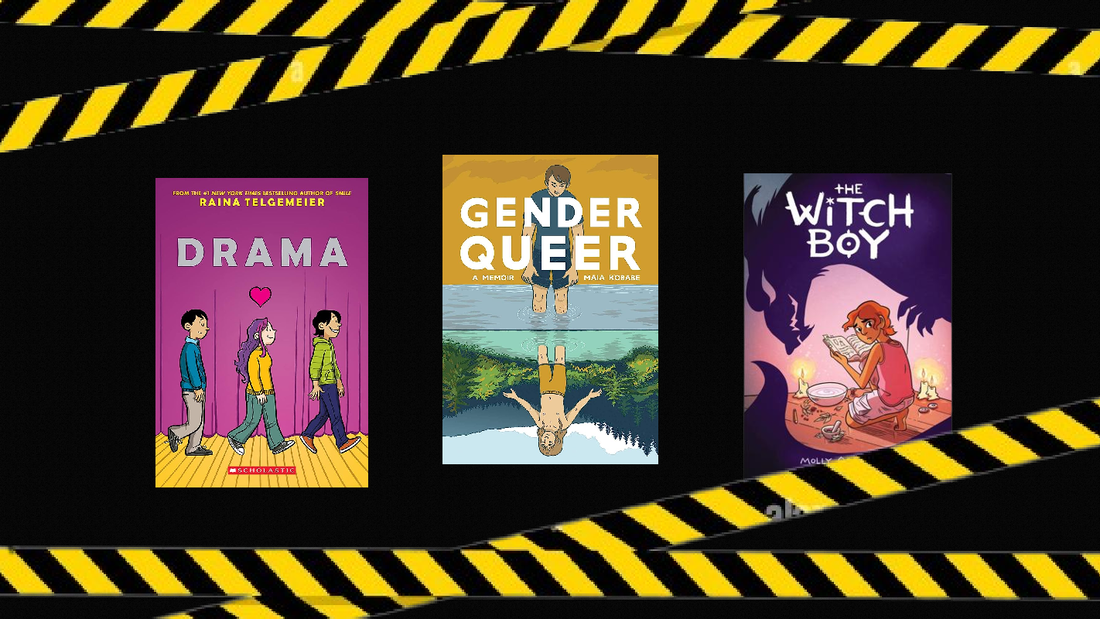"When I was 8 I read the graphic novel Witch Boy by Molly Knox Ostertag at the time I didn't realize it was a metaphor for transness, but it really helped me see my gender and identity," said 6th grader in literary arts, winter Johnson
When I was 8 I read the graphic novel Witch Boy by Molly Knox Ostertag. This book is about a kid from a family of witches where boys grow up to be shifters and girls grow up to be witches. But this boy wanted to be a witch instead of a shifter. It's a super great book and is really inspiring for young trans kids for the fact that it has a lot of representation, like Aster wanting to be a witch instead of a shifter, and also Aster is a pretty gender neutral character. At the time I didn't realize it was a metaphor for transness, but it really helped me see my gender and identity.
The author of that book, Molly Knox Ostertag, recently spoke up at the New York Comic Con (NYCC) about Scholastic Publishing giving into fascist book banning, and giving libraries and schools the option to opt out of including “controversial” books in their book fairs, including LGBTQIAP2+ books like I previously reviewed in Queer media reviews. She did this despite them being her publisher—risking her whole career to get the message heard.
“I'm entreating Scholastic,” said Ostertag, “specifically the Book Fair Division, to stand up for your authors, your books, and most importantly the kids we make these books for. Because books are very literal lifelines.”
“I'm entreating Scholastic,” said Ostertag, “specifically the Book Fair Division, to stand up for your authors, your books, and most importantly the kids we make these books for. Because books are very literal lifelines.”
Book bans are happening all over the country. With a variety of books including lots of classics such as, To Kill a Mockingbird, and The Bluest Eye. According to PEN America, 40% of the book bans from 2021 to 2023 were in Florida school districts. They even went so far as to try to ban the children's book, Read Me a Story, Stella by Marie-Louise Gay. It was dubbed “sexually explicit” because the writer's last name was “Gay.” Otherwise, it had no queer representation whatsoever.
“Scholastic is supposed to inform people of diversity, but are instead succumbing to our sexist, racist, homophobic, society,” said Maia Cavagnolo, a 7th grade Literary Arts student.
“Scholastic is supposed to inform people of diversity, but are instead succumbing to our sexist, racist, homophobic, society,” said Maia Cavagnolo, a 7th grade Literary Arts student.
Last month senator John Kennedy did a public reading of one of the most banned books in America, Gender Queer, by Maia Kobabe. Later, a video of the reading went viral and received tons of satirical comments. For those who don't know yet, Gender Queer is a YA graphic novel memoir that follows Maia Kobabe on ers journey through self discovery, gender exploration, and sexuality.
“The wave of book challenges that started in 2021 was fueled by a very organized and intentional conservative push to make trans rights the new hot-topic talking point along with things like abortion and immigration,” Kobabe says.
“The wave of book challenges that started in 2021 was fueled by a very organized and intentional conservative push to make trans rights the new hot-topic talking point along with things like abortion and immigration,” Kobabe says.
Because authors like Ostertag stood up for what they believed in, Scholastic publicly apologized for its policy and retracted it immediately. In defense of their policy, Scholastic Books stated:
“Because Scholastic Book Fairs are invited into schools, where books can be purchased by kids on their own, these laws create an almost impossible dilemma: back away from these titles or risk making teachers, librarians, and volunteers vulnerable to being fired, sued, or prosecuted,” Scholastic said in an ABC article.
Despite this, authors have continued to create books and advocate for releasing book bans.
“Because Scholastic Book Fairs are invited into schools, where books can be purchased by kids on their own, these laws create an almost impossible dilemma: back away from these titles or risk making teachers, librarians, and volunteers vulnerable to being fired, sued, or prosecuted,” Scholastic said in an ABC article.
Despite this, authors have continued to create books and advocate for releasing book bans.


